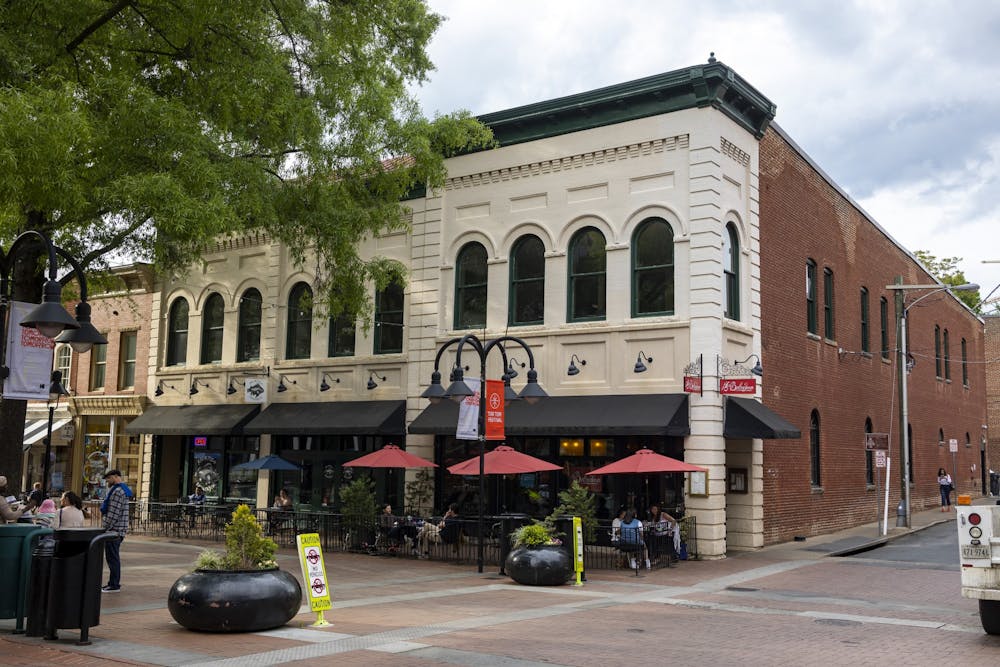From decarbonizing healthcare to creating earthquake-resilient architecture, research projects led by the University’s Environmental Resilience Institute focus on understanding humans’ role in the natural world. Moving forward, the center has been renamed the Environmental Institute to better encompass its expanded mission — helping combat climate change through student and community engagement.
The formerly-named Environmental Resilience Institute was founded in 2017 to support work across Grounds on climate change and environmental solutions. Allison Carter, communications manager of the Environmental Institute, said the goal of the new name is to reflect the Institute's expanded mission to include broader environmental services for the University and Charlottesville community and specifically increased funding for climate focused community research.
“We're trying to think of ways to take all the amazing research being done and explore its impacts in whatever avenues and tools we have available to us,” Carter said. “Thinking through impact means trying to get the story out there about climate change and environmental resilience work.”
In the coming years, the Institute will be expanded to include climate change and environment-related research and engagement on Grounds through the new $10 million Climate Collaborative, a program to fund four to six interdisciplinary research teams to lead climate-related projects at the University.
Leon Szeptycki, associate director of the Environmental Institute and law professor, said the projects will center on place-based research around climate change solutions in specific communities in and outside of Virginia.
“How could the community be made more resilient to the impacts of climate change?” Syzepticki said. “How could the transition happen in a way that doesn't disproportionately impact economically disadvantaged communities? All of those things are on the table for the climate collaborative.”
The Institute also plans to expand research and engagement opportunities for undergraduate students. Karen McGlathery, director of the Environmental Institute and professor of environmental sciences, said one of these opportunities will be the Decarbonization Corps, an initiative where an undergraduate student, a faculty member and a practitioner in the field will work together on a project to reduce carbon dioxide emissions in the atmosphere.
“This is a new program that we're piloting this summer,” McGlathery said. “We're pretty excited about it and hoping that it will grow.”
The Environmental Institute conducts their research with an emphasis on interdisciplinary climate change research, bringing collaborators together across schools and departments to work on research projects. The Institute also partners with the University Career Services to provide environment-related summer internships and J-term externships to students. It also partners with community organizations like the Community Climate Collaborate and Virginia Clinicians for Climate Action.
The center will host Chris Mooney, Pulitzer-Prize winning journalist at The Washington Post, for a Rotunda Dome room event May 1 at 4 p.m. to mark the official changing of the name. Pre-registration is not required, but seating is limited to the first 100 attendees.
Explaining the story of climate change research and data in a way the general public can understand is important to the impact of climate change research, Carter said. Mooney will speak on this topic at the renaming event during his talk “How Data & Narrative Work Together to Inform the Public” in the Dome Room of the Rotunda.
Mooney reports on climate change, energy and the environment for the Washington Post and is a lecturer at the Yale School of the Environment. As part of a Washington Post team, Mooney received the Pulitzer Prize for a series of articles investigating areas in the United States that exceeded the two degrees Celsius increase in temperature described by scientists as a marker of climate change. Mooney works at the interface between scientific data and communication.
“I believe that all kinds of powerful and important stories are sitting there in datasets that journalists often are not even looking at,” Mooney said. “Scientists look at them but they often don't look at them the way we look at them.”
Mooney said he plans to discuss two specific articles that successfully told the story of research to readers. In one article on the rising water temperatures around the Denman glacier in Antarctica, Mooney focused on how a seal and a robot provided researchers with data that indicates signs of potential climate disaster. Mooney said that communicating this research can have a big impact by engaging readers on serious concerns in the world.
“[These stories] can really work powerfully and as we do more, especially of data journalism that is becoming very important to journalism, we need the help of experts more than ever,” Mooney said. “We depend on the research community and we need… to work together to get these stories out.”
The new Environmental Institute will have offices on the Downtown Mall in Charlottesville and hold student events on-Grounds. In August the Institute plans to host the Environmental Futures Forum to highlight the environment and climate-related research being conducted at the University.







